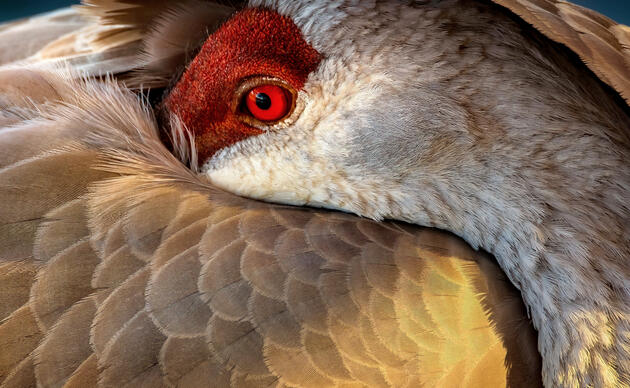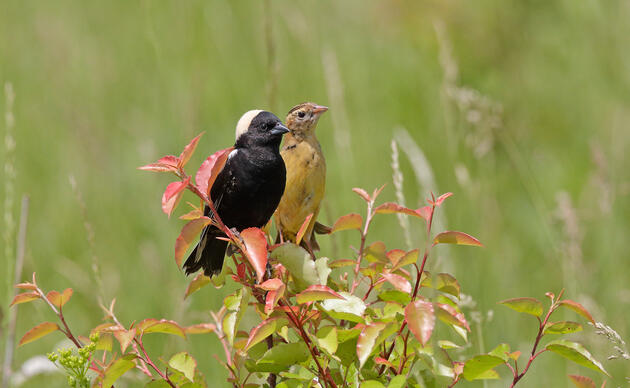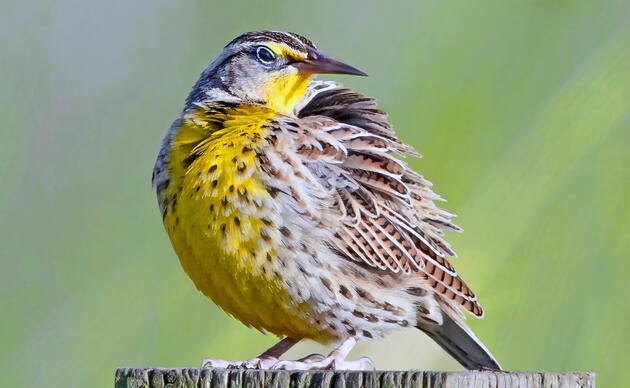(WOOD RIVER, NEBRASKA – September 27, 2023) Yesterday, several local conservation groups hosted a tour to discuss conservation easements, private land rights, and the importance of keeping agricultural land large enough to remain viable as working farms and ranches.
The tour was led by Brice Krohn of the Crane Trust, in partnership with Audubon Nebraska, Ducks Unlimited, The Nature Conservancy, and Nebraska Land Trust. Todd McWha and Dean Fedde, local landowners, also spoke about their easement properties. Dave Sands of Nebraska Land Trust spoke about agricultural producers being essential to the wider conservation effort in Nebraska, especially in keeping working farms in the hands of local families.
“Like every working farm in Sarpy County, we received a Greenbelt designation to relieve our tax burden,” said landowner Dean Fedde. “[Gretna] city limits are only three and a half miles away and their jurisdiction now reaches within one- and one-half miles. Within the near future, [if] the city of Gretna were to extend their limits to envelope our farm, the Greenbelt taxation designation we received would only be protected because we have a permanent conservation easement in place. Greenbelt [designations are] not permitted within city limits, so it would be extremely difficult to remain a working farm without our easement.”
“At the end of the day, it’s a property right,” said Dave Sands of Nebraska Land Trust. “[Nebraska Land Trust] designs our easements to be for working agriculture. There is no ‘typical’ easement, we start with the landowners’ goals. Most importantly, keeping the family on the land...42% of agricultural land buyers are not agricultural buyers.” Real estate is no longer local, he said, out-of-state investors are buying land in western Nebraska for recreational use, where prices are lower than neighboring states. But once developed for other uses, “selling and fragmenting the land is permanent.”
Kristal Stoner, Executive Director of Audubon Nebraska, said that Spring Creek Prairie Audubon Center has been working in partnership with Solidago Conservancy and the city of Lincoln to create connected trails and native habitat between city parks, nature centers, and surrounding suburban and rural communities. Spring Creek Prairie recently announced a 310-acre land acquisition that will connect a new easement with the city’s Prairie Corridor trails. The city of Lincoln now has more than 157 miles of public trails, many of them restored through conservation easements partnerships with local conservation groups providing funding and expertise, knowing these public assets will be protected for future generations.
In Nebraska, conservation and agricultural land easements are a voluntary, free-market, incentive-based approach to protect privately-owned land for specific uses, such as habitat restoration or agricultural production. Habitat restoration can be costly yet is important for many landowners, so the combination of a conservation and agricultural land easement and habitat restoration helps private landowners achieve their goals they would be unable to afford without financial compensation. This mutually beneficial agreement ensures the habitat investments made by conservation entities are a wise investment and landowner goals are achieved. By keeping lands in private ownership that conserve natural Nebraska, the taxpayer does not bear the cost of land management, but can share in the benefits.
Media Contact:
Melissa Amarawardana, Melissa.Amarawardana@audubon.org, 402.999.3404
About Audubon
The National Audubon Society protects birds and the places they need, today and tomorrow. Audubon works throughout the Americas using science, advocacy, education, and on-the-ground conservation. State programs, nature centers, chapters, and partners give Audubon an unparalleled wingspan that reaches millions of people each year to inform, inspire, and unite diverse communities in conservation action. A nonprofit conservation organization since 1905, Audubon believes in a world in which people and wildlife thrive.



